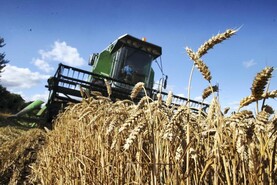Minister for Agriculture Charlie McConalogue is now almost a year in the role. So far, he has proved himself to be a safe pair of hands and has shown a strong level of empathy and connection with the sector.
He is also talking the talk, both in his ongoing engagement with farmers and on the international stage. Speaking at the Pre-Summit to the UN Food Systems Summit in Rome this week, the minister told delegates that Ireland’s Food Vision 2030 envisages a transformational pathway to a position of world leadership by dealing with the three pillars of sustainability: economic, environmental and social.
However, the minister can only keep talking for so long. There comes a point when farmers will need him to actually present this “transformational pathway” that will address the challenge of economic sustainability at farm level. Is it credible for the minister to talk on an international stage about Irish agriculture moving to a position of world leadership a week after Teagasc income figures show 43% of Irish farmers earning less than €10,000 per annum? Only if he has the plan to deliver it.
In the coming weeks and months, he will be responsible for agreeing emission ceilings that will shape the direction of travel for the next 10 years and beyond. At the same time, he will be required to finalise a range of measures and schemes under the CAP strategic plan that will determine how €10bn will be distributed on to Irish farms from 2023-2027.
With €300m per annum in direct payments now linked to environmental measures, his ability to shape policy that can deliver both an economic and environmental dividend will be tested. At the same time, the minister muse ensure his department is fully prepared for added Brexit regulations in the autumn. The past year has shown the minister has the ability to talk the talk – the coming months will show if he can walk the walk.

\ Jim Cogan
Farm safety: make one change
The Irish Farmers Journal is running a competition to encourage farmers to make one change that will improve safety on their farms.
There are €2,000 worth of prizes up for grabs, with a €1,000 prize for the winner and two €500 prizes for two runners-up.
So far, the response has been excellent and in this week's edition we profile some of the entries received already.
The competition closes on Tuesday 3 August and entries can be submitted here
Minister for Agriculture Charlie McConalogue is now almost a year in the role. So far, he has proved himself to be a safe pair of hands and has shown a strong level of empathy and connection with the sector.
He is also talking the talk, both in his ongoing engagement with farmers and on the international stage. Speaking at the Pre-Summit to the UN Food Systems Summit in Rome this week, the minister told delegates that Ireland’s Food Vision 2030 envisages a transformational pathway to a position of world leadership by dealing with the three pillars of sustainability: economic, environmental and social.
However, the minister can only keep talking for so long. There comes a point when farmers will need him to actually present this “transformational pathway” that will address the challenge of economic sustainability at farm level. Is it credible for the minister to talk on an international stage about Irish agriculture moving to a position of world leadership a week after Teagasc income figures show 43% of Irish farmers earning less than €10,000 per annum? Only if he has the plan to deliver it.
In the coming weeks and months, he will be responsible for agreeing emission ceilings that will shape the direction of travel for the next 10 years and beyond. At the same time, he will be required to finalise a range of measures and schemes under the CAP strategic plan that will determine how €10bn will be distributed on to Irish farms from 2023-2027.
With €300m per annum in direct payments now linked to environmental measures, his ability to shape policy that can deliver both an economic and environmental dividend will be tested. At the same time, the minister muse ensure his department is fully prepared for added Brexit regulations in the autumn. The past year has shown the minister has the ability to talk the talk – the coming months will show if he can walk the walk.

\ Jim Cogan
Farm safety: make one change
The Irish Farmers Journal is running a competition to encourage farmers to make one change that will improve safety on their farms.
There are €2,000 worth of prizes up for grabs, with a €1,000 prize for the winner and two €500 prizes for two runners-up.
So far, the response has been excellent and in this week's edition we profile some of the entries received already.
The competition closes on Tuesday 3 August and entries can be submitted here







 This is a subscriber-only article
This is a subscriber-only article










SHARING OPTIONS: